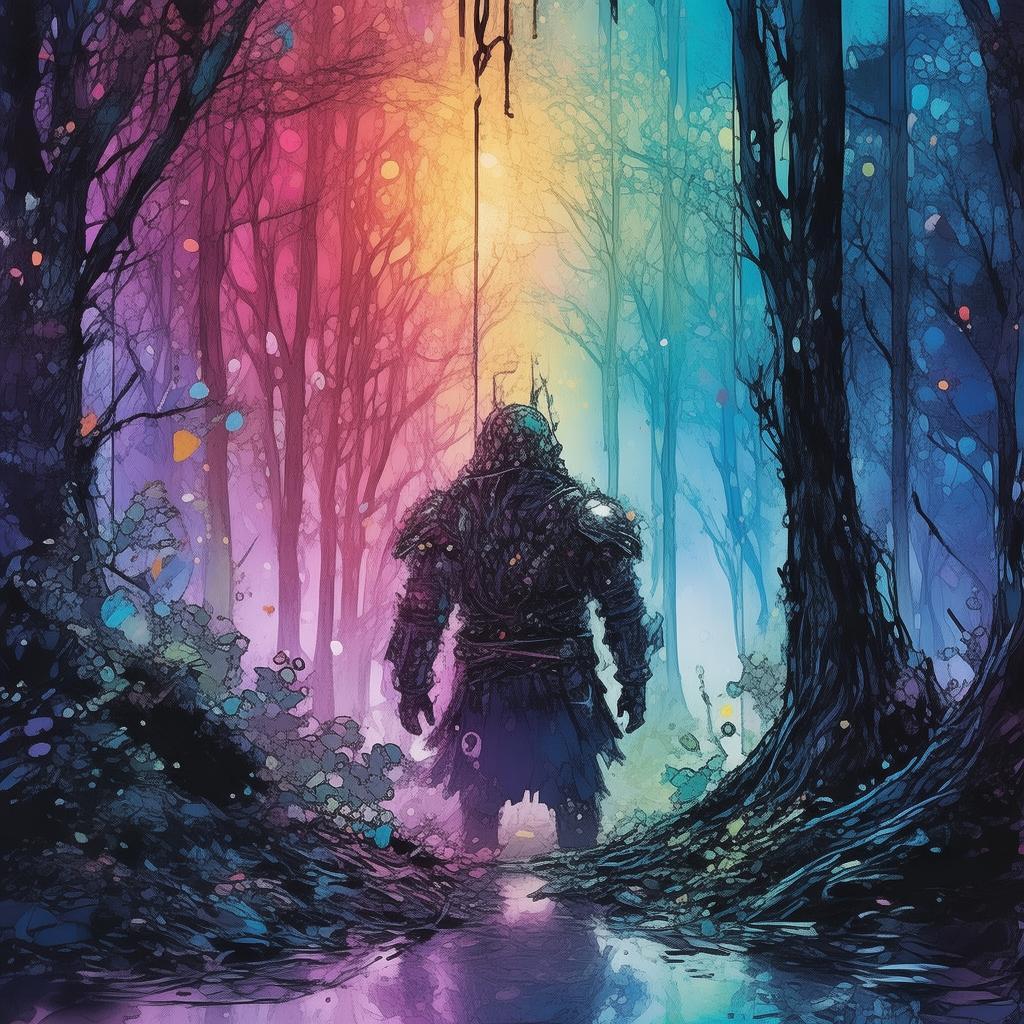The Labyrinth of Echoed Truths
The sun dipped below the horizon, casting a golden hue over the ruins of a long-forgotten civilization. In the center of the ancient city, a labyrinth of stone and shadows lay in ruins, its walls covered in carvings of philosophical debates and figures of lovers entwined in eternal embrace. Among the ruins, a young philosopher named Aether wandered, his eyes reflecting the dim light as he traced the enigmatic carvings with his fingers.
Aether had heard tales of the labyrinth from his mentor, Gorgon, a renowned philosopher who had spent his life seeking the truth behind the ancient world's greatest mysteries. The labyrinth was said to hold the keys to understanding the very fabric of reality, and Gorgon had tasked Aether with navigating its depths to uncover the ultimate truth.
The labyrinth was more than a physical structure; it was a place of philosophical debate, where the great thinkers of the ancient world had grappled with the nature of existence. As Aether delved deeper into the labyrinth, he encountered chambers lined with statues of philosophers, each embodying a different philosophical school of thought.

In one chamber, he encountered a statue of Pythagoras, his eyes filled with a serene wisdom. "The key to understanding the universe lies in mathematics," Pythagoras seemed to say, his voice echoing in Aether's mind. Aether nodded, understanding the relevance of the Pythagorean theorem to the structure of the universe.
In another chamber, Socrates materialized before him, his face etched with concern. "The unexamined life is not worth living," Socrates declared, his words resonating with Aether's own beliefs. Aether nodded, feeling a deep connection to the philosopher's quest for self-knowledge.
As Aether continued his journey, he encountered more chambers, each housing a different philosopher. He saw Plato discussing the nature of reality and the concept of the ideal forms, Aristotle pondering the principles of logic and causality, and even the enigmatic Zenon of Citium, who spoke of the infinite regress and the impossibility of change.
Yet, as he ventured deeper into the labyrinth, the philosophical debates began to intertwine with another thread of his life: the love he held for a young woman named Elysia. Elysia had been born into a rival family, and their love was forbidden by both their families. Despite the risks, they had secretly met beneath the moonlit sky, sharing their dreams and hopes for the future.
One fateful night, Elysia had been captured by her family and brought to the labyrinth, where she was to be executed as a traitor. Aether had been torn between his love for her and his duty to Gorgon, who had warned him of the dangers that awaited him within the labyrinth.
As Aether reached the final chamber, he found Elysia bound to a stake, her eyes filled with fear and sadness. The air was thick with tension as he approached her, his heart heavy with guilt and love.
"Did you come for me?" Elysia's voice was barely audible over the echo of her own fears.
"Yes," Aether replied, his voice breaking. "I couldn't leave you here."
Before he could reach her, a shadowy figure stepped out from the shadows, the figure of Gorgon. "Aether, you have come to the end of your journey. The truth you seek lies within yourself."
Gorgon produced a mirror, and Aether looked into its depths. He saw not only himself, but also the faces of the philosophers he had encountered. In the reflection, he realized that his own beliefs and passions were the truest form of philosophy.
"I understand now," Aether said, his voice filled with newfound clarity. "The truth is love, and the love is the truth."
With those words, Gorgon stepped aside, revealing the exit. Aether and Elysia embraced, their love transcending the boundaries of their world. As they left the labyrinth, they knew that their love, like the labyrinth itself, was a journey into the depths of their souls, a quest for the ultimate truth of existence.
The Labyrinth of Echoed Truths was a tale of love, philosophy, and the eternal quest for understanding. It was a story that would resonate with readers, sparking discussions and reflections on the nature of truth, love, and the human condition.
✨ Original Statement ✨
All articles published on this website (including but not limited to text, images, videos, and other content) are original or authorized for reposting and are protected by relevant laws. Without the explicit written permission of this website, no individual or organization may copy, modify, repost, or use the content for commercial purposes.
If you need to quote or cooperate, please contact this site for authorization. We reserve the right to pursue legal responsibility for any unauthorized use.
Hereby declared.









